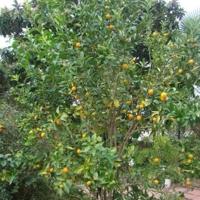The transformation of Baraitali union under Chakaria upazila of Cox’s Bazar is mind-boggling.
A vast area of land that was used for cultivating tobacco even five years ago is now blazing with red roses.
In the fields, and on the sides of the roads – one will notice rose gardens everywhere in the “Golap Graam” or “village of roses”, a new name that Baraitali union has gotten in recent years for here people are dedicated to growing roses.
Apart from Baraitali, other unions of the upazila, including Harbang, also have witnessed a surge in rose cultivation over the years as farmers are increasingly shifting from tobacco to flowers. About Tk10 crore worth of flowers are sold from some 200 flower gardens of the upazila every year, catering to a big portion of flower demand in Chattogram, Cox’s Bazar, Rangamati, Khagrachari, and Bandarban districts.
Data obtained from the upazila agricultural office show that around 272 acres of land in Chakaria upazila has been brought under flower cultivation this year, which include rose in about 173 acres and gladiolus in about 99 acres.
Photo: Mohammad Minhaz Uddin/TBS.
“>
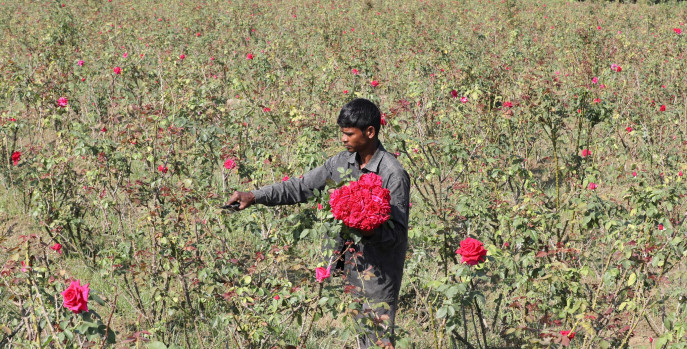
Photo: Mohammad Minhaz Uddin/TBS.
These villages were mostly dependent on tobacco farming even a decade ago, said people concerned, adding that awareness campaigns conducted by the Department of Agriculture Extension and some local NGOs about the harmful impacts of tobacco have helped to change the scenario.
How rose cultivation began in Baraitali
In the early 19th century, Zamindar Babu Shri Nabin Chandra Dey created a garden of red roses at his home in Baraitli village. He collected saplings of various species of rose from Kolkata and Dhaka and planted those in the courtyard of his house.
During the late 20th century, another rose lover, Rabban Quaderi, a resident of Baraitli village, raised another beautiful garden at his home by collecting high-quality seedlings of different colours of roses from Kolkata and Dhaka.
Hobby turns into commercial venture
These two persons’ love for roses spread among the villagers. Growing a small rose garden in the front yard of the home became a hobby of almost everyone in the village.
And that hobby turned into a business for many of the locals two decades ago after several NGOs started working to create anti-tobacco awareness among local youth and farmers.
Their campaigns later turned into social movements.
Photo: Mohammad Minhaz Uddin/TBS.
“>
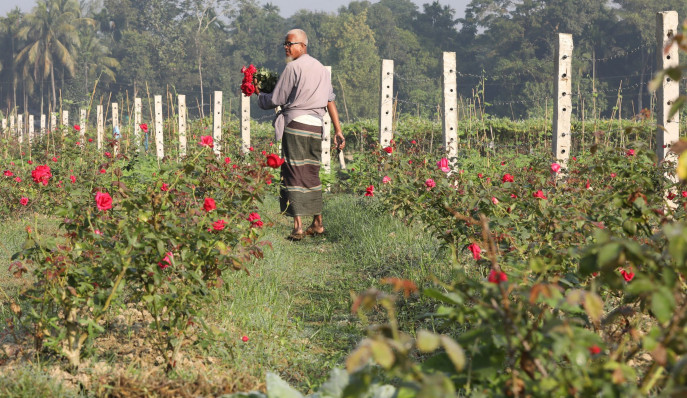
Photo: Mohammad Minhaz Uddin/TBS.
Some of the NGOs including Ipsa have been providing training on rose cultivation in Chakaria and the adjacent upazilas.
Also, the Department of Agricultural Extension and development organisations have started encouraging farmers to cultivate alternative crops to tobacco by undertaking various activities and pilot projects, changing the face of agriculture in Baraitli.
Moinul Islam, president of Baraitli Flower Garden Owners Association, told The Business Standard, “All the rose gardens you see today in Baraitli were once tobacco fields. About two decades ago, I started commercial cultivation of roses on four acres of land. It is not just me, but all the educated youth of Chakaria took up rose gardening as a movement to get rid of harmful tobacco farming. Few in the village now cultivate tobacco.”
He said 60 acres of land in Braitali union alone is being used for rose farming this year. Besides, gladiolus has been cultivated on 40 acres of land.
Ipsa Chief Executive Arifur Rahman told TBS, “Our target is to make Bangladesh tobacco-free by 2040. To this end, we have long been encouraging tobacco farmers to grow alternative crops including rose. But, tobacco farming is still going on near the banks of the River Matamuhuri in Chakaria in violation of the law. The government agencies concerned lack information about tobacco farmers.”
While on a visit to Baraitali union recently, TBS saw rows of rose gardens on both sides of the Chattogram-Cox’s Bazar. Sometimes, one or two gladiolus gardens could be seen.
Farmers said there are about 70 rose gardens in North and South Baraitali villages.
Photo: Mohammad Minhaz Uddin/TBS.
“>
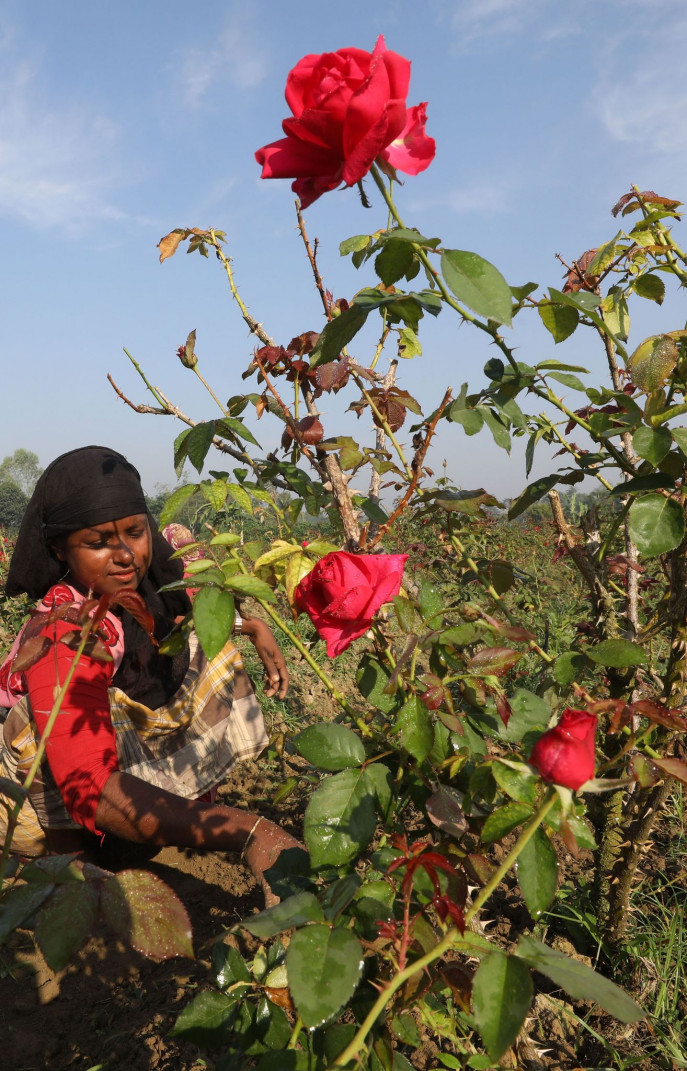
Photo: Mohammad Minhaz Uddin/TBS.
Now a thriving business
Roses remain in demand almost throughout the year, which is why they are grown all year round, the farmers said. They, however, said the demand for the flower goes high in the December-April period during the winter season as various national days and festivals including Martyred Intellectuals Day, Victory Day, Independence Day, International Mother Language Day, Pahela Baishakh, and Valentine’s Day are observed during this time.
Flower farmers said most of the roses produced in these gardens are supplied to flower shops in Chattogram’s Cheragi Pahar Flower Market. The remaining roses go to nearby district towns including Cox’s Bazar.
At present, 100 roses are selling for Tk500-600 to wholesalers, farmers told TBS, adding the price will go up to Tk700-800 in the winter season.
But, the demand for flowers dips during the monsoon season and farmers have to count losses during that season.
Mujibul Haque of the Ekota Bazar area in the upazila started rose cultivation three years ago on his 40 decimals of land. He needed to invest Tk50,000 to start the garden. Currently, he sells flowers worth Tk40,000 per month.
Mujibul Haque told TBS, “Once upon a time we used to grow tobacco. But just as hard work is involved in tobacco farming, so are the risks. Relatives did not visit our homes, family members used to suffer from illness very often. So, I left tobacco and started rose cultivation three years ago. At present, 1,000 to 1,200 roses are collected from the garden every day and they are sold at Tk5-6 per piece.”
Mohammad Murad of South Baraitli village has been cultivating roses on 120 decimals of land for the last 10 years. There are about 10,000 rose trees in his garden.
He told TBS, “12 workers work in my garden throughout the year. This garden sells flowers worth about Tk17-18 lakh annually. Every year, Tk6 lakh is spent on garden maintenance including fertiliser and irrigation.”
Photo: Mohammad Minhaz Uddin/TBS.
“>
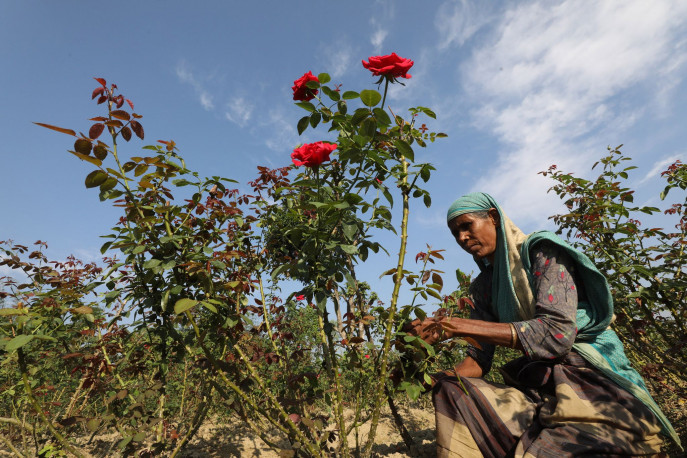
Photo: Mohammad Minhaz Uddin/TBS.
Local woman Manwara Begum has been working in this garden for 10 years.
She said, “I do not have a husband. I have two daughters in the family and one of them is a person with disabilities. I have been working in a rose garden to run my family. I get a daily wage of Tk300.
Like Manwara, hundreds of local people including women are employed in the rose gardens of the area, helping to accelerate income growth and poverty reduction in the rural economy.
Chakaria Upazila Agriculture Officer SM Nasim Hossain told TBS that tobacco cultivation in the upazila is decreasing day by day, thanks to awareness campaigns by local youths and the agriculture department.
But, the Covid pandemic dealt a big blow to the flower business, he noted, adding that farmers are trying to recover from the Covid-induced losses since last year.
He also identified marketing challenges as the biggest problem faced by the flower farmers of the upazila.
Photo: Mohammad Minhaz Uddin/TBS.
Photo: Mohammad Minhaz Uddin/TBS.
